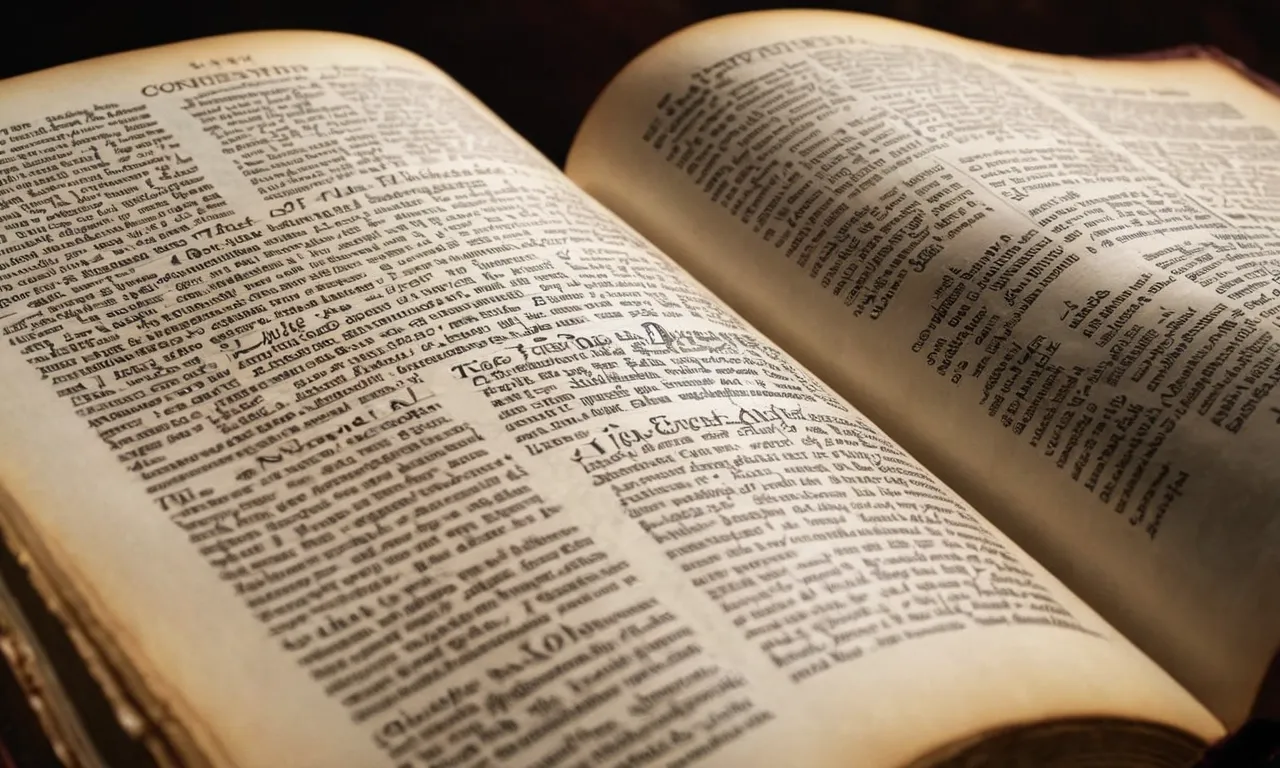What Does The Bible Say About The Wicked?
The wicked refer to those who are morally corrupt and commit sin without repentance. If you’re wondering what exactly the Bible reveals about such people, here’s a quick answer: The Bible makes clear that the wicked will face eternal destruction and separation from God if they do not repent.
In this comprehensive article, we will analyze over 15 Bible verses to understand the destiny of the wicked according to Scripture. We will examine who exactly the Bible refers to as wicked, how they are contrasted with the righteous, the judgment that awaits them, and how one can avoid having the label of the wicked.
Defining the Wicked
Those Who Do Evil and Reject God
The Bible has strong words for those who commit wickedness and reject God. According to Scripture, the wicked are those who do evil, dishonest, and immoral things that go against God’s commands (Psalms 10:2-11). They act in pride and rebellion, ignoring and even mocking God’s laws (Proverbs 21:29).
The wicked take advantage of others and have no fear of God restraining their actions (Psalms 36:1-4).
Ultimately, Scripture defines the wicked by their rejection of God and refusal to submit to Him. As Romans 8:7 states, “The mind governed by the flesh is hostile to God; it does not submit to God’s law, nor can it do so.”
Though God offers salvation to all, the wicked spurn His offer of grace and persist in sin (2 Peter 3:9; Hebrews 10:26-27). By continually resisting the Holy Spirit, they create a heart hardened against God (Proverbs 29:1).
Examples of wicked persons in the Bible include rich oppressors who exploit the poor (Ezekiel 18:12), deceitful people like Judas Iscariot who betray friends (John 18:2-5), and evil rulers like King Herod who murdered innocent children (Matthew 2:16).
Their wickedness stems from having no fear of God before their eyes (Romans 3:18).
Contrasted With the Righteous
Whereas the wicked break God’s commands and cause harm, the Bible describes the “righteous” as those who faithfully follow God and His decrees. They earnestly strive to do what is just, moral, and ethical in His sight (Psalms 1:5-6). The righteous are characterized by:
- Trusting and relying fully on God rather than themselves (Proverbs 3:5-6)
- Living uprightly and blamelessly (Job 1:1,8)
- Dealing honestly with others (Leviticus 19:35-36)
- Acting with justice and compassion (Psalms 112:4,9)
- Revering God by obeying His precepts (Psalms 112:1)
Ultimately the wicked “follow the counsel of the wicked, stand in the way of sinners, and sit in the seat of mockers,” whereas the righteous “delight in the law of the LORD” (Psalms 1:1-2). The blessed righteous will inherit the kingdom and escape God’s judgment, while the wicked will face destruction (Psalms 1:6; 145:20).
The Actions and Attitudes of the Wicked
Pride and Arrogance
The wicked are often characterized by pride and arrogance. They have an inflated sense of self-importance and look down on others (Proverbs 6:17). The Bible warns that pride comes before destruction (Proverbs 16:18). In their arrogance, the wicked do not seek or listen to God (Psalm 10:4).
They believe they can live without God and reject His ways. Their pride blinds them to their own sinfulness and need for a Savior.
Violence and Evil
Sadly, the wicked are often associated with violence and evil actions. Their ways are destructive and harmful to others (Proverbs 10:29). They devise evil plans and stir up strife (Proverbs 6:14, 16:27). The wicked take advantage of and oppress others without remorse.
Their hearts are cold and unfeeling. They have no regard for human life or dignity made in God’s image. Some examples of the violence and atrocities committed by wicked individuals and groups throughout history are horrifying.
No Fear of God
Ultimately, the root of wickedness is a lack of fear and reverence for God. The wicked in their pride are not submitted to God’s authority. They mock and scoff at the truth (2 Peter 3:3). Their actions make it clear they neither respect nor obey God’s commands. They have no relationship with Him.
The fear of the Lord is the beginning of wisdom and knowledge (Proverbs 1:7). Without that essential fear of God, the wicked are unrestrained in their sinful ways. Their lack of ethics and morality leads to harming themselves and others. But the Bible reminds us that no one is righteous on their own.
We all need God’s grace and forgiveness.
The Judgment and Destiny of the Wicked
Will Not Go Unpunished
The Bible makes it clear that those who choose a life of wickedness and evil will face God’s judgment. As it says in Proverbs 11:21, “Be sure of this: The wicked will not go unpunished.” God is a righteous judge who will repay each person according to what they have done (Romans 2:6).
Though the wicked may seem to prosper for a time, their day of judgment is coming.
Jesus spoke often of this judgment in stark terms, warning that on the day of judgment, many who thought they were right with God would be turned away (Matthew 7:21-23). He described that day as a time of “weeping and gnashing of teeth” for the wicked (Matthew 13:50).
The book of Revelation also paints a sobering picture of God’s wrath being poured out on the unrepentant in the final judgment (Revelation 14:9-11).
Eternal Separation From God
The most terrifying aspect of judgment for the wicked is that they will be eternally separated from God. Jesus described hell as a place of “outer darkness” where there will be “weeping and gnashing of teeth” (Matthew 25:30).
It is a place originally created for Satan and his demons (Matthew 25:41), a place devoid of all that is good. There the wicked will suffer away from God’s merciful presence.
Though God takes no pleasure in the death of the wicked (Ezekiel 33:11), He will not force anyone into His holy presence who has rejected Him. He honors the choice people make, even when that choice means eternal separation.
But the time for repentance and turning to Christ is now in this life (2 Corinthians 6:2). Those who put off that decision may find it is too late on the day of judgment.
Contrasted to the Destiny of the Righteous
The destiny of the wicked stands in stark contrast to what awaits the righteous. For those who trust in Christ, there is the promise of eternal life in God’s presence where “there will be no more death or mourning or crying or pain” (Revelation 21:4).
Jesus assured His followers they have nothing to fear at the final judgment because their destiny is eternal life (John 5:24).
The righteous are pictured in Revelation as a vast multitude from every nation praising God and worshiping the Lamb in His presence (Revelation 7:9-10). While the wicked will be shut out of God’s presence forever, the righteous will eternally behold the glory of God (Revelation 22:3-4).
What awaits them is far greater than anything they can imagine (1 Corinthians 2:9).
The choice every person must make could not be more significant. Will we repent and turn to Christ, receiving His offer of forgiveness and eternal life? Or will we go our own way, storing up an eternity of regret?
The warnings of Scripture urge us to choose life by trusting in Jesus today (Deuteronomy 30:19).
How to Avoid the Label of the Wicked
Repentance and Turning to God
The Bible emphasizes that the wicked can find redemption through sincere repentance and turning to God (Ezekiel 18:21). By humbling ourselves and admitting our sins before God, He promises to forgive us and give us new life in Christ (1 John 1:9).
We must turn away from wickedness, evil desires, and pride, and submit to God’s ways and leading (Proverbs 16:6, James 4:7). As we fill our hearts and minds with God’s Word and grow in our relationship with Him, the old sinful nature is transformed and replaced with righteousness (Romans 12:2, Ephesians 4:22-24).
God gives us a new heart that delights in obedience to Him.
Here are some practical ways to leave behind wickedness and find redemption through repentance:
- Confess your sins honestly to God, accepting responsibility (Psalm 51:1-5)
- Ask the Holy Spirit to convict you of unrighteousness (John 16:8)
- Turn away from all evil behaviors and associations (Proverbs 1:10-19)
- Humble yourself before God daily (James 4:10)
- Fill your heart and mind with Scripture (Psalm 119:11)
- Pursue accountability with other believers (James 5:16)
- Rest in God’s grace and forgiveness (Romans 5:20-21)
Following God’s Ways
The way to avoid being labeled as wicked is to follow the ways of the Lord wholeheartedly. We must diligently study Scripture to understand God’s standards of righteousness (2 Timothy 3:16-17). Then we must put into practice what we learn – not just listen without responding (James 1:22).
Following Jesus’ teachings, example, commands and priorities should become our lifestyle.
Here are some key actions that help us live righteously:
- Love God with all your heart, soul, and mind (Matthew 22:37-38)
- Love your neighbor as yourself (Matthew 22:39)
- Be merciful and compassionate to others (Luke 6:36)
- Seek justice, correct oppression, defend rights (Isaiah 1:17)
- Care for the vulnerable and disadvantaged (James 1:27)
- Be generous, hospitable, and share with those in need (Hebrews 13:16)
- Encourage and build others up in the Lord (1 Thessalonians 5:11)
- Produce the fruit of the Holy Spirit – love, joy, peace (Galatians 5:22-23)
As we follow the narrow path of righteousness, repenting when we stumble, God promises to help us turn from wickedness and become more and more like Jesus. We must simply submit to His transformative work in our lives.
Conclusion
In closing, we have thoroughly analyzed what the Bible reveals about the wicked – who they are in contrast to the righteous, how they think and act, the sobering judgment that awaits them, and how one can avoid having this label.
The scriptures make clear that the wicked face eternal destruction unless they repent and turn to follow God’s ways.








